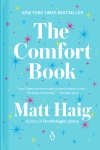With The Comfort Book, bestselling author Matt Haig has created a book which is essentially a personal journal shared with the world. This unique and thoughtful read provides a gentle dose of affirmation and self-care on every page, whether you’re experiencing the worst day of your life or you are just feeling a little lost.
By Sofia Peslis
The Comfort Book is a collection of consolations. Matt Haig tells stories giving us new ways to see ourselves and the world around us. A mixture of memoir, philosophy, and reflections, Haig’s book reads like advice from a friend and becomes a celebration of the chaotic miracle of being alive.
A Messy Collection of Emotions
Matt Haig, journalist and bestselling author of the 2020 novel The Midnight Library, begins The Comfort Book by giving his readers a heads up about the way the book is structured. It will be, as he says, »a messy read« and because the book isn’t a novel, Haig recommends that you read it however you want:
You can start at the beginning and end at the end, or you can start at the end and end at the beginning, or you can just dip into it.
Chapters range from short to long, have lists, quotes, case studies, and even recipes. Nevertheless, there is a theme of connection running through The Comfort Book, regardless of its structure. Everything seems to be linked: hope to despair, pain to happiness, loss to love. The fact that everything is connected makes us constantly aware that we do not need to strive to be anything other than what we are or meet anyone else’s expectations. It also reminds us that the simple fact that we exist is a reason for hope and joy.
Authenticity Is Key
It is common for collections of this sort to have some parts that will hit home and offer you surprising insights, some that may feel familiar, and others that may seem incomprehensible or out-of-date. Haig’s personal experience with suicidal depression several years ago helps him take a hard-won approach to topics like pain, mental-health, self-worth and contentment. In light of this, the reader should give some of the material a closer look, despite the fact that it may feel contradictory to one’s own experience.
You have survived everything you have been through, and you will survive this too. Stay for the person you will become. [….] You are another self at a point in future time looking back in gratitude that this lost and former you held on. Stay.
Our mental health affects all our actions, thoughts, and choices in life. With The Comfort Book Haig tries to embrace flaws, bad days, mistakes, and wrong choices. Reading this intriguing book, one will feel lonely no more. By recalling personal events of his life and explaining them to the reader, Haig manages to create a sense of belonging. On the feeling of being lost, Haig recalls an incident with his father in a forest in France. Disorientated and off-track for hours, his father told him: »If we keep going in a straight line we will get out of here.« There was some truth to what his father said, and it was one of the pieces of wisdom he turned to during his depression and when he decided to move forward.
Many aphorisms might not sound groundbreaking but are still deeply true. In the book, there is a constant resistance to the idea that we must somehow earn our worth as human beings through success, which, as the book argues, is becoming dangerously prevalent in our modern society. Furthermore, Haig manages to detach from these dangerous and toxic mindsets by using a diverse range of sources for The Comfort Book, like inspirational female journalists, buddhist monks and philosophers. All of these sources are presented nonhierarchically, without being subjected to any judgment based on authority.

Matt Haig
The Comfort Book
Penguin Life: New York 2021
272 pages, 22,00$
Like a Warm Hug On Cold Days
A friendly, nonjudgmental, and open tone characterizes Matt Haig’s whole book, which might help readers create their own positive foundation of self-love. It could even be an invitation to start your own personal comfort book by writing down life lessons, music-lists or favourite quotes.
With its latest Winter Edition, The Comfort Book adds exclusive new chapters on winter comfort and gives off a warm feeling with a winter-inspired cover. Especially during the cold months, it is important for many people to find something warm they can hold on to:
Don’t worry about being cool. Never worry what the cool people think. Head for the warm people. Life is warmth.
Whether you’re at a low ebb or just need some hope for the future, the book offers guidance on a range of topics, from disquietude to self-acceptance. And even if you’re not feeling low or in need of encouragement, after all, The Comfort Book can be viewed as exactly what it is: a comforting book. Like a warm hug on cold days.






